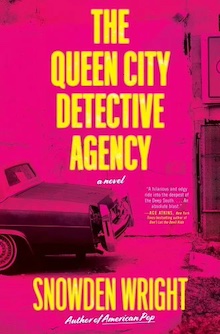Our Research Notes series invites authors to describe their process for a recent book, with “research” defined as broadly as they like. This week, Snowden Wright writes about The Queen City Detective Agency from William Morrow.
+
The Wild West of East MS

On January 1, 1984, Robert “Peanut” Griffin, a petty criminal on trial for murder, broke out of a Mississippi courthouse jail and, during a standoff between him and my father on the courthouse roof, threatened to kill my pregnant mother, my unborn sister, and me, two years old at the time.
Peanut Griffin’s jailbreak and how my father, the district attorney prosecuting his case, eventually talked him off the roof has since become a staple of family lore. You never forget your first death threat.
A few years ago, I’d finished writing one novel and began to consider what I wanted to write next. I started, atypically for most writers, including myself, with genre. I’ve always been an omnivorous reader, moving between literary fiction and horror and thrillers and Westerns and science fiction, with rest stops in poetry, nonfiction, and comic books along the way. More than any other type, though, I love to read crime novels. But why?
I found the answer in my memory of Peanut Griffin’s jailbreak. For me, crime novels have never been genre fiction. They’re realism.
As a child, I named my dog “D.A.” because it was the term I heard most often around the house. I had no idea what it meant; I just liked the sound of it. Although my father did his best to insulate our family from the more unsavory parts of his job—murders, prostitution rings, meth labs—he could not quit being himself, an unrepentant and incurable storyteller. At an infamously disreputable bar called the John Wesley Hardin Club, according to one of his many stories of questionable authenticity, my father was stopped by a woman covering the door. “Sir, are you armed?” she asked.
“No, ma’am,” my father said, indignant at the very notion.
From behind a nearby counter the woman retrieved a revolver. She handed it to my father and said, “You can borrow this one. I think you’ll need it, honey.”
East Mississippi was, to judge by the stories I heard over dinner, like the Wild West. Back in the 1980s, my hometown served as a hub along the extralegal trade routes between New Orleans, Atlanta, Birmingham, and Memphis, as well those two hotbeds of the Dixie Mafia, Phenix City in Alabama and Biloxi on the Mississippi coast. Aside from the aforementioned murders, prostitution rings, and meth labs, Meridian opened its tatted arms to armed robbery and stoked a welcoming hearth for arson. Larceny was invariably grand, assault frequently aggravated.
I did not grow up unaffected by that kind of world. Where most children might see a good place to build a fort—an abandoned cabin, a derelict grain silo—I saw places where a dead body was liable to have been disposed.
In other words, I had plenty of material for a crime novel, but I still needed to figure out how to package that material. What sort of crime fiction should I try to write?
Although my past two novels are considered literary fiction, I wrote them with other genres jimmying the locks of their plotlines, crowbarring the windows of my voice: mysteries, fantasy, historical fiction, even soap operas. The Queen City Detective Agency is the product of a similar heist. It may be crime fiction, but it’s literary, as mindful of character nuance as it is of narrative rhythm, with equal attention paid to moral complexity and the firing power of a 9mm. I didn’t want to subvert genre tropes so much as use them in new ways. With Queen City, I tried to dig up and examine the systemic roots that lead to racism, sexism, anti-intellectualism, and classism, how each feeds into and off the other to create perhaps the worst –ism of all: nationalism. This novel is an autopsy of the American Dream.
Peanut Griffin’s jailbreak may have been my jumping-off point for the book—pun very much intended—but it is nonetheless a work of fiction. I made changes, major and minor, to the real-life incidents, some for ethical reasons, others for story purposes, and the rest from authorial whim.
On starting the novel, I had expected to prove that crime fiction is the perfect place to bury the body of the American Dream. On finishing it, I understood that literary crime fiction may be the perfect place to reanimate that particular corpse. Hope is hard to kill; few hitmen would take that job. By exploring the worst in this country, I began to see the best in its people, and by exploring the worst in its people, I began to see the best in this country.
The result, I hope, reanimates a corpse. Maybe I wrote a sci-fi novel after all.
+++
Born and raised in Mississippi, Snowden Wright is the author of American Pop, a Wall Street Journal WSJ+ Book of the Month and NPR Best Book of the Year. He has written for The Atlantic, Salon, Esquire, The Millions, and the New York Daily News, among other publications, and previously worked as a fiction reader at The New Yorker, Esquire, and The Paris Review. Wright was a Marguerite and Lamar Smith Fellow at the Carson McCullers Center, and his small-press debut, Play Pretty Blues, received the Summer Literary Seminar’s Graywolf Prize. He lives in Yazoo County, Mississippi.